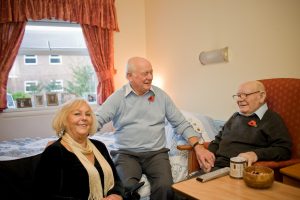Families matter: 4 things that help families to have confidence in care teams, by Cath Holmes
Cath Holmes is Director of Care Quality at Anchor and a member of the My Home Life England Board.
We spoke to Cath about how to best support the family and friends of someone living in a care home, so that they have confidence in the care team and feel assured that their relative is being well cared for.
“When it comes to the day-to-day running of a care home, we can easily forget how difficult things can be for those individuals who really care about what is going on, but who aren’t there all the time. I’m talking about families, friends and other loved ones. We must of course meet the needs of the person who lives in the care home, but we must also meet the needs of the family members and others who care about that person.
These four things help families and friends to have confidence in care teams and in the leadership of a care home:
1. Positive first impressions
From the minute someone walks into a care home they are making a judgement, assessing what they can see, hear, smell and feel. You can actually sense very quickly when you’re in a good home. It should look clean, smell fresh, and feel welcoming and homely. You should see residents safely moving around and observe caring and compassionate interactions with care staff. Visitors should be made to feel welcome every time they visit and at any time of the day. A great home is a great home regardless of whether the registered manager is present – this is because the leadership has clearly set the expectations and has created a positive culture that their team proudly models and wants to be a part of.
You can feel it when care colleagues understand and know the people they care for, by the way they engage and give reassurance, and by their actions when someone looks or becomes distressed. Similarly, families want to feel reassured that care colleagues understand their relative’s preferences. This also includes the little touches – for example how they wear their hair, how they like a crease in their trousers and what is special to them. These intricacies help demonstrate that colleagues aren’t just caring for a person, they know them, which in turn gives comfort and assurance. This should be the case for everyone living in the care setting, whether they have visitors or not, because ‘we care’ for everyone.
2. Continued involvement
It’s essential that families and those acting on behalf of residents are kept involved and updated, not just in relation to the usual care planning, reviews and healthcare, but also about social events and activities. Knowing that the care home is connected to the community ensures that people remain connected – including to the places they may well have lived and worked. Being invited to events and knowing about the range of activities available helps reassure family and friends that their loved one has the opportunity to get involved (if they wish), and to feel a part of the home.
Working in care, we should all recognise how privileged we are to share so many special moments with those we support. Sadly, this may also include end-of-life care, and we have one opportunity to get this right. Ensuring we fully understand a person’s wishes in advance, and involving and supporting their family and friends, is something we should all hold precious in our hearts.
3. Two-way communication
 Regular, clear and open communication is so important. Visitors to the care home should know who manages the home and they should be able to access the manager (or their leadership team) to ask questions, give feedback or discuss any concerns. Family members and/or those acting for a person should be involved in their care planning and reviews. They should also be promptly made aware of any incidents or healthcare involvement (as appropriate).
Regular, clear and open communication is so important. Visitors to the care home should know who manages the home and they should be able to access the manager (or their leadership team) to ask questions, give feedback or discuss any concerns. Family members and/or those acting for a person should be involved in their care planning and reviews. They should also be promptly made aware of any incidents or healthcare involvement (as appropriate).
Providing regular formal and informal opportunities for residents and their family and friends to give feedback and share their ideas is a key part of listening and acting. Family and friends need to feel able to speak up and know that they’ll be listened to. In turn care colleagues need to keep their promises to act, so that everyone feels reassured by the outcome, and that concerns were actioned, and improvements implemented and followed through appropriately. We also need to make sure all relevant colleagues in the home are informed.
4. Effective leadership
Effective leadership makes all this possible. The manager sets the standard for everything that happens in the home, including the culture, the pace, the standards and the expectations. Ultimately, a care home is the reflection of the leader. If you’re a manager and your culture in the home needs to change, then you are the one that needs to change it. If you’ve not got the tools to do this, you need to go out and get them! Continual learning and improvement must be a part of this culture. Educating, learning, reflecting on practice, and getting better, better, and better, is what it’s all about.
Everyone in the home has a role to play, and no one person should be deemed more important than another – it’s a team approach which delivers great care. For example, the housekeeper keeps the home clean, supports infection control and creates an inviting, comfortable environment for residents and for visitors, who in turn feel welcomed and at ease.
In summary…
All care homes should be places where people love living and the care is fantastic. But also important is to not lose sight of the needs of the family and friends of those we support. We need to assure them that the person they care about is not only receiving great care, but they’re content and living well in the home. When you’re always welcomed when you visit, are kept informed of what’s happening, know the person you care about is content and their daily living, emotional, medical, psychological needs are being met, then you will have confidence in the care provided.”
In this blog, Cath emphasises the importance of effective leadership, saying that it “makes all this possible”.
My Home Life England supports effective leadership through our Professional Support and Development Programmes for care leaders. In our last analysis, 98% of participants reported an increase in the quality of their management and leadership, with 99% reporting improvement in understanding of how to improve the culture of care in their care setting, both which, as Cath says, helps families and other loved ones to have confidence in the care provided to their relative.
Care leaders tell us how much they value having the space to support their professional development, and how improving their leadership and communication skills, professional confidence and resilience has a ripple effect within their care service. For more information about our programmes, visit our programmes page:
See more about our programmes
